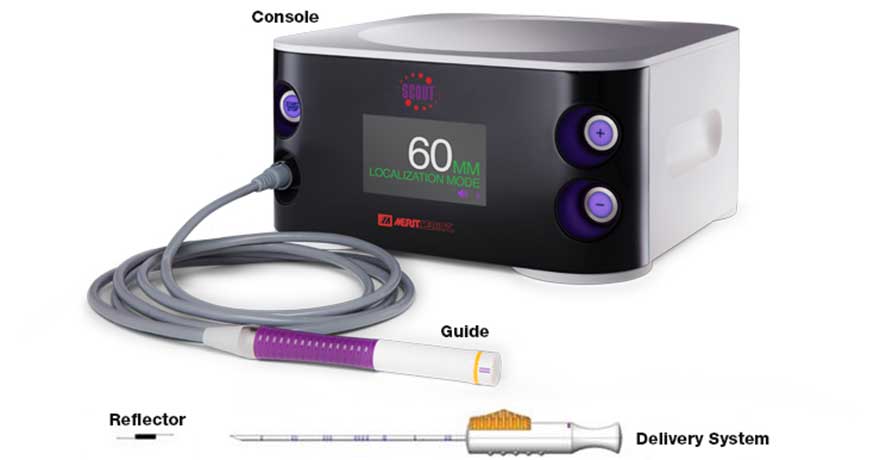Breast-Conserving Surgery Now in Brookings
- Spring 2023

Early-stage breast cancer patients now have one less medical treatment far from home with Brookings Health System’s addition of breast conserving surgery. Brookings Health invested in the SAVI SCOUT surgical guidance system, an FDA-approved radar localization technology that pinpoints tumors before surgery. It helps General Surgeon Dr. Sara Marroquin of Avera Medical Group Specialty Care and Brookings Health’s surgery team to remove only cancerous and abnormal breast tissue.
SAVI SCOUT uses a reflector about the size of a grain of rice. If a patient’s abnormality has a BI-RADS 4c or higher from their diagnostic mammogram, the radiologist will insert the reflector at the same time they take a biopsy. The reflector marks the tumor and biopsy site prior to neoadjuvant therapy if needed.
At the time of surgery the SAVI SCOUT guide allows Dr. Marroquin to lock on to the reflector’s exact location. The SCOUT system provides real-time distance measurement within 1 mm accuracy in all tissue types. This helps to define the ideal incision, the preferred surgical pathway and the depth of the anterior surgical margin in order to excise an ideal, predictable specimen. After excision, Dr. Marroquin applies the SAVI SCOUT guide to the specimen and verifies the reflector’s removal and location relative to the surgical margins.
Prior to surgery, Marroquin will present patients’ cases to Avera’s tumor board to determine the best possible cancer treatment and care plan for every patient. In addition, patients are connected to other cancer services as needed, including cancer navigation, oncology and radiation.
Benign Indications for Breast-Conserving Surgery
Certain benign breast conditions increase a patient’s risk for developing breast cancer. Benign breast pathology includes non-proliferative lesions, proliferative lesions without atypia and atypical hyperplasia. Benign conditions that require surgical excision include:
- Ductal carcinoma in-situ (DCIS), considered the earliest form of breast cancer even though it is noninvasive and hasn’t spread out of the milk duct
- High-risk benign lesions, including proliferative lesions both with and without atypia
- Benign lesions that are asymptomatic but cause significant pain, such as breast cysts and galactoceles
- Benign instances accompanied with high-risk genetics, such as BRCA1 and BRCA2 genes
Benign lesions that are proliferative without atypia are associated with a small increased risk of breast cancer. Instances in which surgical removal with an excisional biopsy is recommended include:
- Intraductal pappillomas greater than 1 cm
- Sclerosing adenosis when atypia is present
- Radial scars, also referred to as complex sclerosing lesions
- Adenomas
- Fibroadenomas greater than 10 cm if the patient prefers
- Pseudoangiomatous stroma hyperplasia
Benign lesions that are proliferative with atypia indicate a high risk for breast cancer in either breast, usually developing as invasive ductal carcinoma (IDC). Instances in which these should be removed include:
- Atypical ductal hyperplasia
- Atypical lobular hyperplasia
- Lobular carcinoma in-situ if a discordant case of imaging or pathology findings or if it is non-classic lobular carcinoma in-situ
- Flat epithelial atypia if the patient prefers
Other Benign Breast Conditions
Non-proliferative lesions usually do not require surgery. Non-proliferative lesions that are NOT associated with an increased risk of breast cancer include:
- Breast cysts (may be removed if causing significant pain)
- Galactoceles (may be removed if causing significant pain)
- Papillary apocrine change
- Epithelial-related calcifications
- Mild hyperplasia of the usual type
- Fibrocystic changes
Other benign lesions that do not need to be removed unless symptomatic include:
- Lipomas
- Fat necrosis
- Diabetic mastopathy
- Harmatoma
- Idiopathic granulomatous mastitis
- Sarcoidosis
How to Refer a Patient
Dr. Marroquin is now accepting referrals for patients who have an abnormal mammogram. In addition to the initial consult and performing surgery, she will follow breast cancer patients through the long-term of their breast cancer journey.
If you are a provider who uses Avera’s Meditech Expanse EMR, you may send a referral electronically to Dr. Marroquin by selecting “AMG Breast Surgery Brookings” in the Refer To field. If you are a provider who is not on the Avera EMR, you may refer a patient by calling Dr. Marroquin’s clinic at (605) 697-9664.
For more information:
 Dr. Sara Marroquin, MD, MPH
Dr. Sara Marroquin, MD, MPH
Avera Medical Group Specialty Care
General Surgeon
(605) 696-2700
sara.marroquin@avera.org
 Terri Stauffacher, RN, CNOR
Terri Stauffacher, RN, CNOR
Brookings Health System
Director of Surgical Services
(605) 696-8073
tstauffacher@brookingshealth.org

